-
by Julia Roe
- Updated
- 13 Comments
Top Prebiotics & Fiber Supplements for Gut Health
The human gut is a complex ecosystem teeming with trillions of microorganisms, both beneficial and harmful. These gut bacteria play a crucial role in digestion, nutrient absorption, and even immune function. But how can we support the growth of the “good guys” in our gut?
Enter prebiotics. Prebiotics are dietary fibers that act like fertilizer for our gut’s beneficial bacteria, also known as probiotics. These fibers, which are found naturally in fruits, vegetables, and legumes, are indigestible by humans, but they serve as a fuel source for our resident probiotic colonies.
The Science Behind Prebiotics:
Certain types of fiber, including Fructo-oligosaccharides (FOS), Galacto-oligosaccharides (GOS), and Acacia gum (also known as Gum Arabic), are particularly effective prebiotics. These fibers are selectively fermented by probiotic bacteria, leading to their growth and dominance within the gut microbiome.
Benefits of Prebiotics:
A flourishing probiotic population offers a wide range of potential health benefits. Here are some key advantages linked to prebiotic intake:
- Improved Digestion: Prebiotics promote the formation of healthy stools, leading to smoother digestion and potentially reducing constipation and diarrhea.
- Enhanced Immune Function: A healthy gut microbiome with a strong probiotic presence is associated with a more robust immune system, potentially aiding in fighting off infections and illnesses.
- Potential for Weight Management: Studies suggest prebiotics may contribute to feelings of satiety and fullness, potentially aiding in weight management efforts.
- Overall Health Benefits: Ongoing research explores additional benefits of a balanced gut microbiome, including improved heart health, lower cholesterol, and even positive effects on mood and mental well-being.
What to Look for When Buying Prebiotic Supplements
When selecting a prebiotic supplement, consider these factors:
- Diversity of Fibers: Look for supplements containing a variety of prebiotic fibers like FOS, GOS, and Acacia gum for broader support.
- Organic vs. Non-Organic: Opt for organic prebiotics whenever possible as they are closer to their natural form and potentially better utilized by the body.
- Additive-Free: Avoid prebiotics with long lists of additives, fillers, or dyes, as these might hinder probiotic activity.
- Quality Manufacturing: Choose brands that manufacture their products in cGMP-certified facilities and implement rigorous quality control measures.
Our Top Five Recommended Prebiotic Supplements:
In the following section, we’ll delve into our top 5 picks for prebiotic supplements on the market, analyzing their ingredient profiles and highlighting their potential advantages. By understanding the benefits of prebiotics and choosing the right supplement for your needs, you can take proactive steps towards a healthier gut and potentially optimize your overall well-being.
Overall Score:
BlueBiology is known internationally for their probiotics and other digestive health supplements. Their prebiotic product checks all of our boxes and is one of the few prebiotics with organic sources of FOS and GOS that also includes Gum Arabic. Many of you out there will be happy to hear that this prebiotic contains an anti-bloating enzyme (alpha-galactosidase) that will eliminate the bloating and gas that many prebiotic/fiber supplements can cause.
Users have self-reported a wide variety of benefits from increased energy levels to improved digestion and cognitive function. Many of our staff have started using this prebiotic, as well as myself and my family.
This prebiotic supplement consists of:
- 1500mg organic chicory root powder
- 1500mg lentil root powder
- 5000mg organic gum arabic flour
- 23mg alpha galactosidase
Combining a wide number of probiotic strains with a variety of prebiotics yields a complementary combination that promotes a healthy gut and digestion.
Editors Note: This product is manufactured in an FDA-certified GMP facility, providing additional layers of assurance of safe and quality. -Tony
Pros and Cons:
- Confirmed made in the USA
- Contains Gum Arabic
- Vegan and Gluten-Free
- Easy to mix, blends well with flavors
- Exceptional return policy
- Only sold direct from manufacturer
BeLive Prebiotic Fiber Gummies
Overall Score:
BeLive Prebiotic Fiber Gummies offer a convenient gummy format for prebiotic fiber supplementation. While containing a slightly lower prebiotic dosage than our top pick, this product remains a viable option.
Each serving of BeLive gummies provides 3.35 grams of chicory root extract and 2.5 grams of fructooligosaccharides (FOS). This formulation offers a targeted approach to prebiotic support, leveraging the well-documented benefits of both chicory root inulin and FOS for gut microbiome modulation.
Considerations:
Compared to some competing prebiotic supplements, BeLive gummies prioritize a smaller range of prebiotic fiber types. However, the chosen combination of chicory root and FOS can be effective for most individuals, particularly considering the convenient and palatable delivery method.
Additional Notes:
Further research is ongoing to explore the potential benefits of a wider diversity of prebiotic fibers for gut health optimization. Individuals seeking a broader prebiotic profile might consider alternative options.
Pros and Cons:
- Excellent tasting gummy
- Contains two forms of prebiotics: chicory root and inulin
- Does not contain gluten, wheat, peanuts, soy, eggs, fish, shellfish, or GMOs
- Gluten-free, soy-free, non-GMO
- May help alleviate diarrhea/constipation
- Contains narrow spectrum of prebiotics
- Potential for digestive discomfort; gas/bloating
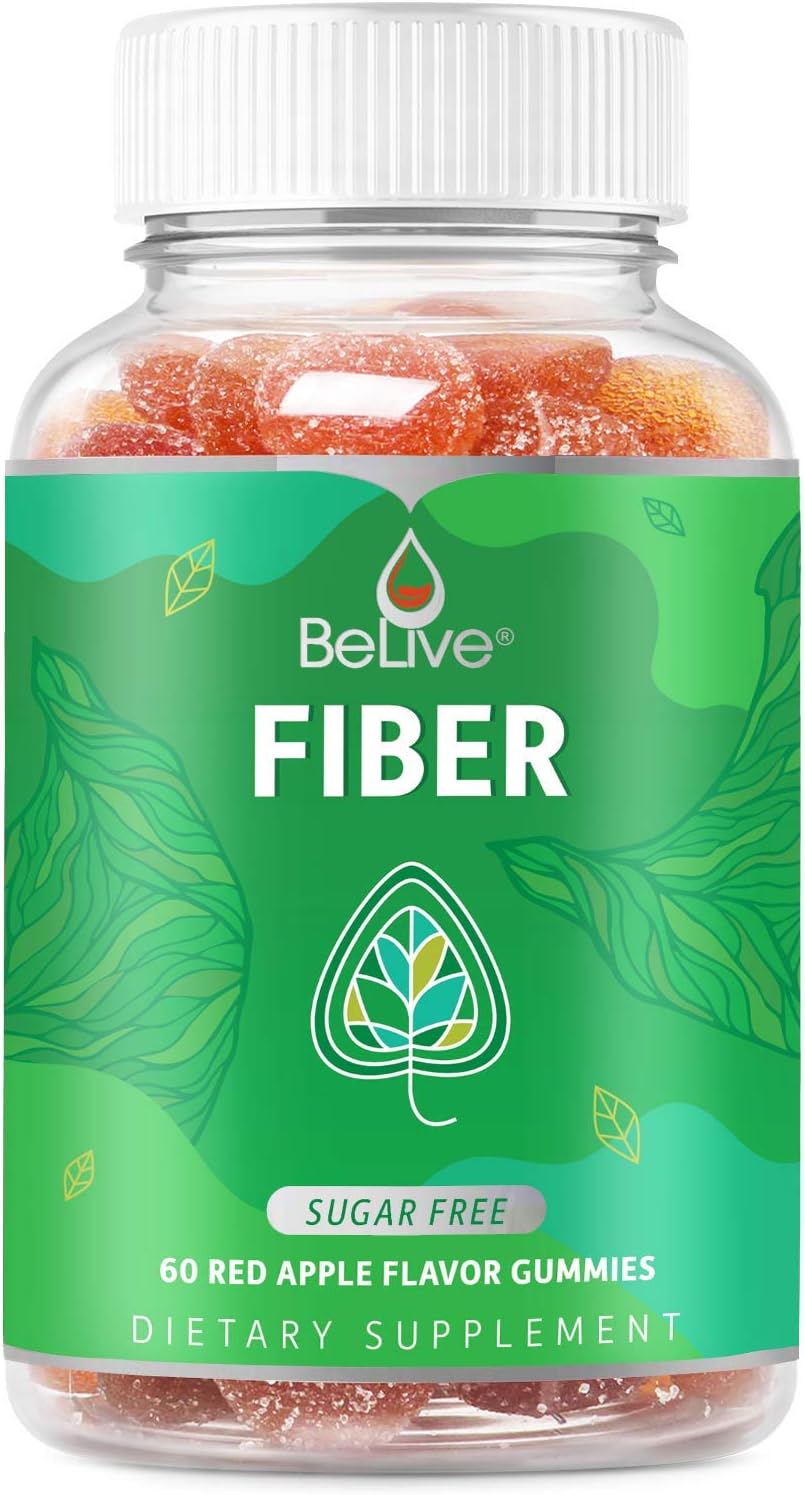
Note: Not an affiliate link! CHR does not benefit and provides links to Amazon as a courtesy to our readers.
Hyperbiotics Organic Prebiotic Powder
Overall Score:
Hyperbiotics’ Organic Prebiotic Powder features a diverse blend of organic prebiotic fibers, including acacia fiber, Jerusalem artichoke fiber, and green banana flour. This formulation offers a broader spectrum of prebiotic support compared to some competitor products.
Ingredient Analysis:
The inclusion of acacia fiber provides a source of soluble fiber with potential benefits for gut health. Jerusalem artichoke fiber offers inulin, a well-researched prebiotic shown to promote the growth of beneficial gut bacteria. Green banana flour, a relatively novel prebiotic source, may offer additional gut microbiome modulation capabilities.
Considerations:
Limited data exists regarding the potential synergistic effects of this specific combination of prebiotic fibers.
Potential Drawbacks:
As with many prebiotic supplements, gastrointestinal side effects like gas, bloating, nausea, and upset stomach can occur, particularly during initial use.
Mixing and Delivery:
The powder form may not mix readily with beverages or food, potentially leading to clumping. Alternative methods of consumption, such as mixing with yogurt or applesauce, might be necessary.
Allergen Considerations:
While the product itself is formulated to be free of common allergens, the manufacturer’s disclosure regarding potential cross-contamination in the production facility warrants caution for individuals with severe allergies.
Pros and Cons:
- Contains three types of prebiotics
- Contains inulin, FOS, resistant starch, and soluble dairy fiber
- Organic (self confirmed)
- Doesn't mix all the well with drinks or food (tends to clump at the bottom of a drink)
- Possible allergen cross-contamination for individuals with extreme sensitivity
- May cause nausea/upset stomach, gas, and bloating
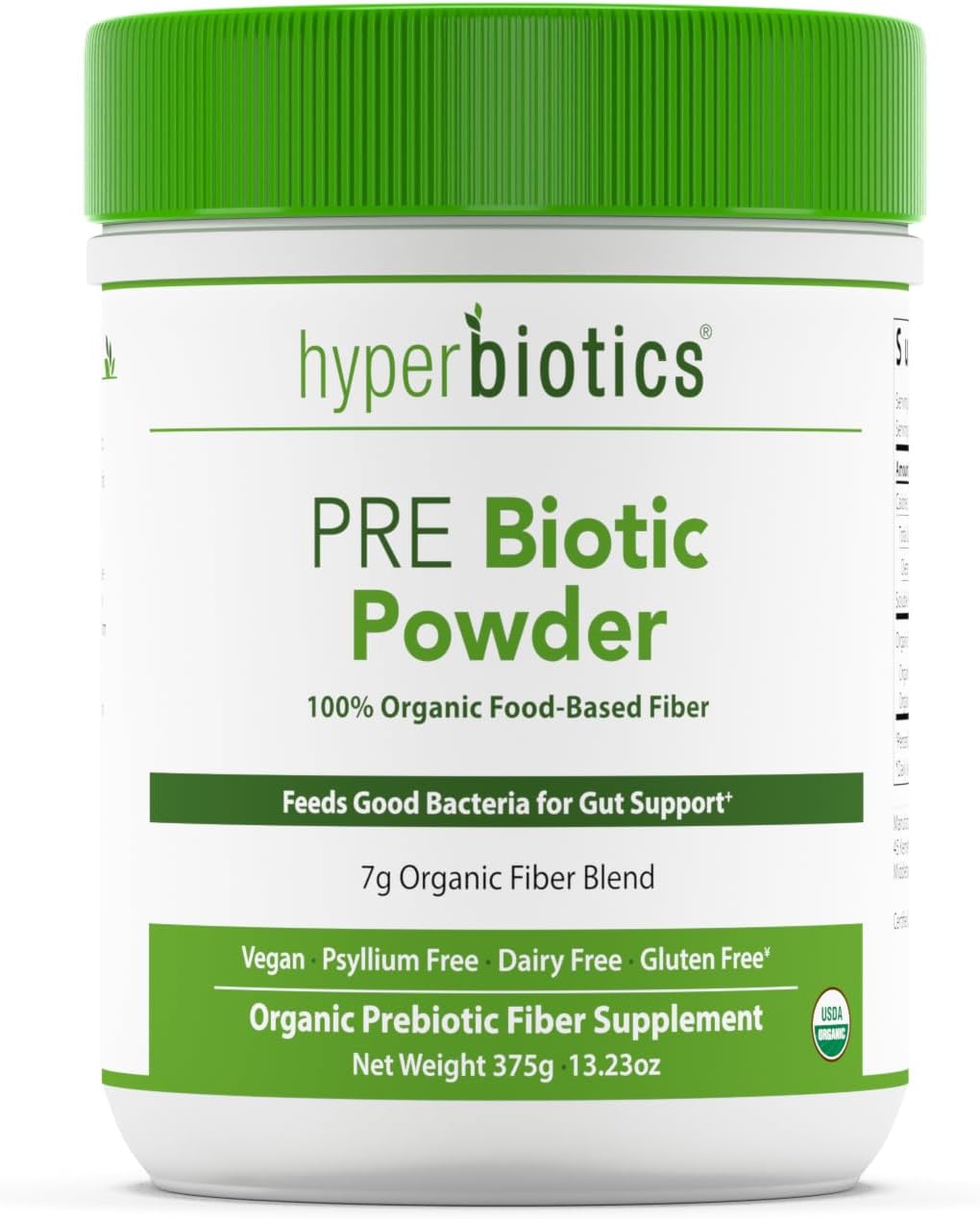
Note: Not an affiliate link! CHR does not benefit and provides links to Amazon as a courtesy to our readers.
BiomeBliss Prebiotic Fiber Blend
Overall Score:
BiomeBliss’ Prebiotic Fiber Blend stands out for its high prebiotic content (16 grams per serving). This formulation includes inulin, blueberry extract, and beta-glucan, offering a diverse range of prebiotic sources.
Ingredient Breakdown:
- Inulin: A well-established prebiotic with documented benefits for promoting gut microbiota health.
- Blueberry Extract: While potentially offering antioxidant properties, the specific prebiotic impact of blueberry extract requires further investigation.
- Beta-Glucan: This soluble fiber may contribute to gut health, but its prebiotic effects might be strain-specific.
Claimed Benefits:
BiomeBliss claims their product supports hunger control, regular bowel movements, and healthy blood sugar levels after meals. While these are potential benefits associated with prebiotic supplementation in general, further research is needed to confirm the specific efficacy of this formulation in achieving these outcomes.
Ingredient Considerations:
Despite being marketed as vegan/vegetarian, the presence of soy products necessitates caution for individuals with soy allergies. Additionally, the inclusion of wheat is a concern for those with gluten intolerance or celiac disease.
BiomeBliss’ Prebiotic Fiber Blend offers a high-dose prebiotic formula with a diverse range of fiber sources. However, the specific prebiotic activity of blueberry extract and beta-glucan requires further investigation. Additionally, the inclusion of soy and wheat necessitates careful consideration based on individual dietary needs and allergies.
Pros and Cons:
- Contains three types of prebiotics
- Promotes regularity
- Good taste mixed with just water
- Vegan/vegetarian
- Contains soy products
- Contains wheat
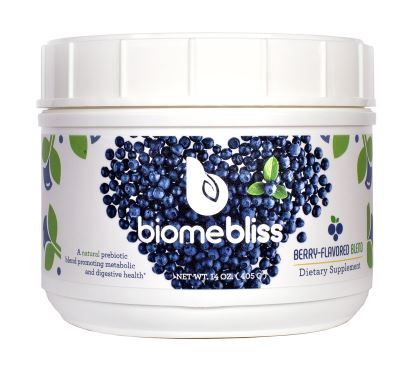
InnovixLabs Broad Spectrum Prebiotic Fiber
Overall Score:
InnovixLabs Broad Spectrum Prebiotic is a prebiotic product that’s not as potent as it gets, but it does have a very wide range of prebiotic types. Getting a wide range of prebiotics either through your diet or in a supplement such as this is ideal because the different types of probiotics each have their preferred prebiotics that they like to feed on.
The prebiotics in this supplement include tapioca isomalto-oligosaccharides (IMO), resistant potato starch, tapioca resistant starch, acacia seyal gum, citrus pectin, larch (larix laricina) arabinogalactan (AG), cane sugar short chain fructooligosaccharides (scFOS), chicory root inulin, green banana (musa paradisiana) powder, corn xylo-oligosaccharide (XOS), guar seed galactomannan, mushroom chitin-glucan, konjac a (amorphophallus konjac) yam (glucomannan).
A serving consists of 5 grams of total carbohydrates, 5 grams of total dietary fiber, and 5 grams of soluble fiber. This supplement is free of sugar, gluten, and soy. It’s also vegan-friendly and non-GMO.
Editors Note: This was the least pleasant-tasting prebiotic we tested. -Tony
Pros and Cons:
- Contains over a dozen prebiotics types
- No added sugar
- Vegan/vegetarian-friendly
- Gluten-free, soy-free, non-GMO
- Poor taste
- 26 daily servings in the 6.4oz size, less than one month
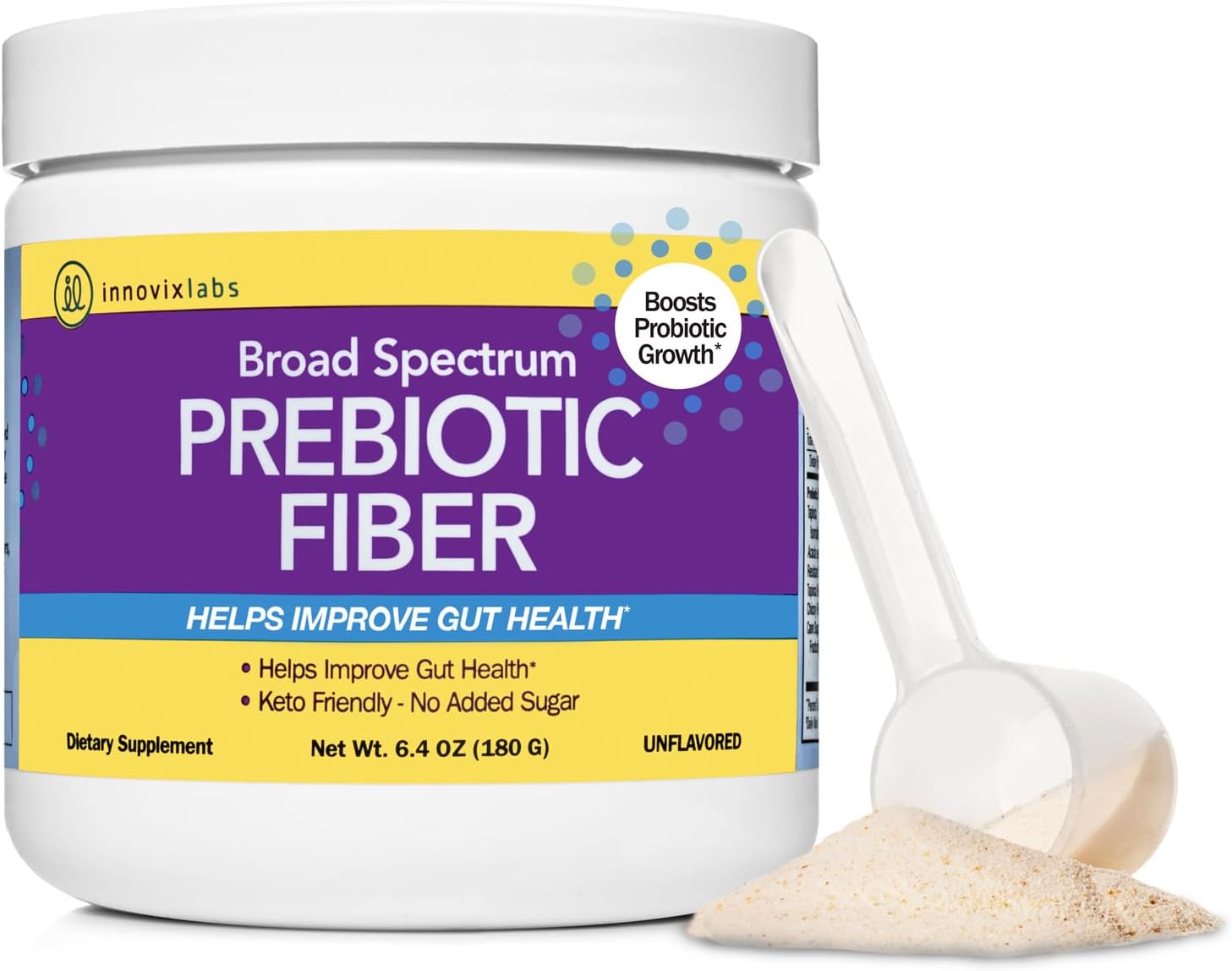
Note: Not an affiliate link! CHR does not benefit and provides links to Amazon as a courtesy to our readers.
Conclusion
Our Top Prebiotic Recommendation:
While several commercially available prebiotic supplements demonstrate efficacy, BlueBiology’s 100% Plant-Based Prebiotic merits particular consideration. While not the most cost-effective option, it offers a comprehensive profile of prebiotic fibers, potentially maximizing its impact on the gut microbiome. Notably, the inclusion of digestive enzymes aims to mitigate the gas and bloating commonly associated with prebiotic supplementation.
Further Considerations:
BlueBiology’s Prebiotic is available for purchase directly through their website or on Amazon.com (links provided below). Importantly, this prebiotic formulation is designed to synergistically complement their probiotic product, BlueBiotics Ultimate Care.



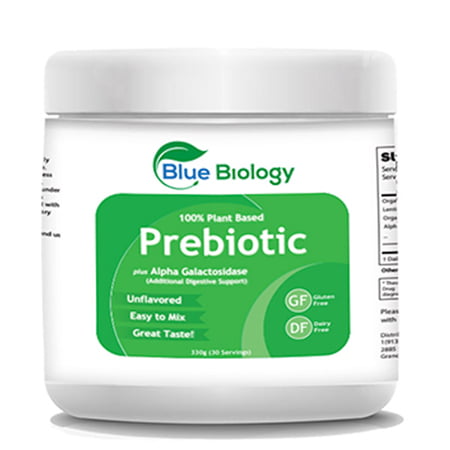

13 Responses
Your blog post was the perfect blend of informative and entertaining. I couldn’t tear my eyes away from the screen!